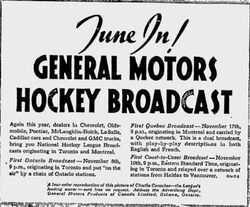Fanofpucks (talk | contribs) |
Fanofpucks (talk | contribs) (Editing a gallery) |
||
| Line 24: | Line 24: | ||
<gallery widths="250" captionalign="center"> |
<gallery widths="250" captionalign="center"> |
||
HNIC1934Ad.jpg|1934 Ad |
HNIC1934Ad.jpg|1934 Ad |
||
| + | HNIC1933Ad.jpg|1933 Ad |
||
</gallery> |
</gallery> |
||
Revision as of 12:44, 8 November 2012
Hockey Night in Canada is a television broadcast of National Hockey League games in Canada, produced by the Canadian Broadcasting Corporation. Hockey Night has consistently been among the highest-rated programs on Canadian television, and is the world's oldest sports-related television program still on the air. The intermission highlight on HNIC is "Coach's Corner", a segment featuring Don Cherry and Ron MacLean.
History

At the Montreal Forum. Courtesy Glenbow Archives. Original photo [1] here
Radio
Hockey Night in Canada has its origins in the General Motors Hockey Broadcast which transmitted Saturday night hockey games of the Toronto Maple Leafs beginning in November 1931 over the Canadian National Railway radio network. In 1933, the CNR's successor, the Canadian Radio Broadcasting Commission, commenced broadcasts of Montreal Canadiens and Montreal Maroons games on its Quebec stations. In 1934, Imperial Oil of Canada took over the sponsorship from General Motors Products of Canada and the broadcast became known as the Imperial Esso Hockey Broadcast. Transmission began at 9 p.m. Eastern Time (the beginning of the second period of play). Starting in 1936, the games were broadcast on CRBC's successor, the Canadian Broadcasting Corporation (CBC) (with the series acquiring its present title around the same time). In much of Ontario and points west the show featured the Maple Leafs and were hosted by Gordon Calder with play-by-play announcer Foster Hewitt and colour man was Percy Lesueur. Montreal broadcasts were hosted by Doug Smith and Elmer Ferguson broadcast for Montreal Maroons games in English and René Lecavalier broadcast Montreal Canadiens games in French. After the Maroons folded in 1938, Smith and Ferguson provided English broadcasts of Canadiens games. The great popularity of the radio show (and its announcer Foster Hewitt) across Canada made it an obvious choice for early Canadian network television programming.
CBC Radio aired Saturday night HNIC broadcasts through 1965, switching to Sunday Night NHL Hockey from 1965–76, after which the games moved exclusively to television coverage. In Toronto, CFRB (originally a CNR Radio affiliate) continued to simulcast Maple Leaf games for many years alongside CBC Radio's Toronto station CBL.

Television
Hockey Night in Canada began airing on Saturday nights on CBC Television in 1952, retaining Imperial Oil as sponsor. It continued to feature regular season NHL games on the English language network every Saturday evening during the NHL season, and retained many of the features such as the Hot Stove Lounge and the three stars selection, which originated as an Imperial Oil gasoline promotion and survived even as sponsorship eventually passed from Imperial to Molson and, later, Labatt.
Until the 1990s, there was only one game televised each Saturday night in any particular locality and up to 1968, regular season games were still not broadcast in their entirety. In the early 1960s, the broadcast time was moved to 8:30 p.m. Eastern Time, which allowed the game to be joined in progress during the first period. Starting in the fall of 1968, regular-season games were shown in their entirety. In 1970–71, the Vancouver Canucks joined the NHL, meaning that there were now three possible venues for an HNIC telecast. Four more Canadian-based teams joined the fold in 1979–80 and 1980–81, further increasing coverage. It should be noted, however, that the Quebec Nordiques were initially never shown at home on HNIC, as their owners, Carling O'Keefe Breweries, forbade Molson from televising games in their building. This was partly in response to efforts by the Montreal Canadiens, who were owned by Molson, to keep Quebec out of the league. After the 1989 merger between Molson and Carling O'Keefe, and the subsequent sale of the Nordiques, HNIC was now free to show games from Quebec City. Still, they rarely did, as the Nordiques English-speaking fan base was very small. They appeared more frequently on La Soiree du Hockey (the French equivalent of Hockey Night in Canada).
After Wayne Gretzky was traded to the Los Angeles Kings in 1988, the network began showing occasional double-headers when Canadian teams visited Los Angeles, in order to give the game's greatest star network exposure in Canada. These games were often joined in progress, as the regular start time for HNIC was still 8:00 Eastern Time and the Kings home games began at 7:30 Pacific Time (10:30 Eastern). Beginning in the 1995 season, weekly double-headers became the norm, with games starting at 7:30 Eastern and 7:30 Pacific. In 1998, the start times were moved thirty minutes earlier.
Instant replay made its debut on a 1955 HNIC broadcast. CBC director George Retzlaff made a kinescope recording of a goal, and replayed it to the television audience seconds later.
Beginning with the 1966–67 NHL season, all games broadcast on HNIC were in colour.
Gallery
External links
- Official Website
- Broadcast schedule
- Hockey Night in Canada at the Internet Movie Database
- Museum of Broadcast Communications
- Hockey Night in Canada theme's official website
- Original version of The Hockey Theme
- Fang's Bites, Videos of the Week: Hockey Night in Canada Opens
Further reading
- Cole, Stephen (2004). The Best of Hockey Night in Canada. Toronto: McArthur & Company. ISBN 1-55278-408-8.
- Gruneau, Richard, and David Whitson. (1994). Hockey Night in Canada: Sport, Identities and Cultural Politics. Toronto: Garamond Press. ISBN 0-920059-05-8.


